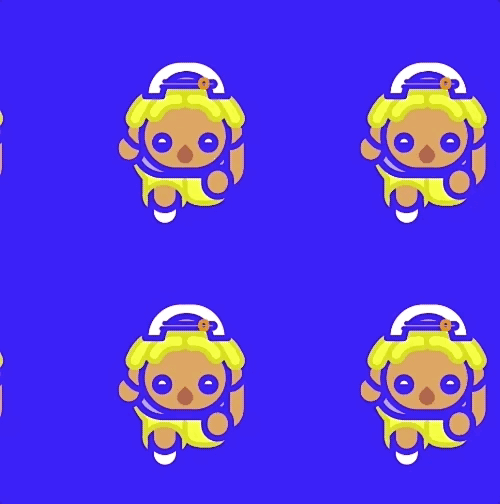Gamifying Resistance: SPEKWORK’s Political Video Games
|DANIEL BEATTY GARCIA

In the mobile game GIGCO: Escape the Gig Economy! you play an Amazon worker, delivering boxes between two points in a warehouse with the tap of a finger on a phone screen. Made by Spekwork, a trio of artists and teachers turned indie game designers, the aim is to last as long as possible before you’re replaced in the supply chain by a robot.
Gigco is a response to gamification – as Spekwork explain, “the use of strategies adapted from video games in order to make people work longer and harder.” But if you want to resist gamification, why gamify resistance? I met the collective at a gaming convention in Berlin to find out.

Why a mobile game?
Cat Bluemke: We were thinking about the ways that apps like Uber control the way you work. We wanted to make a game that was using the medium of the phone to draw connections to the way that those apps are being gamified. So it seemed appropriate to translate this to a mobile game, to a tapping motion, as a way to connect these broader themes to something very simple and approachable, and maybe something more familiar to a broader audience than your average gamer audience. The mobile game market is huge: that’s the platform that most people have to play on, so it’s more accessible. And coming at it from an artistic perspective, we knew that we’re interested in making games in a way that traces back to the medium itself.
Jonathan Carroll: One of the things that drew me to video games was an aversion to the elitism or inaccessibility of art. The relative accessibility of a mobile application, especially one that is modeled after the most basic game mechanics, is a good way to communicate the things that we were talking about.

Uncoding a game’s message requires more than interpreting its internal narrative. Any “argument” at work is distinct from the kinds of arguments that words or images can make – not least because you don’t (or don’t only) look at, or read, a video game: you interact with it. If you leave with a political takeaway from Gigco, it emerges through the immersive, interactive experience of playing it – the actions you choose or are required to perform, as defined by the rules written into the game. In Gigco, form and content merge: the real life game-like experience of the Amazon worker matches Spekwork’s choice of rhetorical medium.
There seems to be a tension or irony in your project. You’re responding to the gamification of the gig economy, and its operation via apps, but your medium is a mobile game app.
Ben McCarthy: We’ve looked at the work of Bifo Berardi, who says that you can’t expect to use technology to offset or to speak back to technology. But it’s an open question among us whether games can actually produce political traction – if technology forecloses on the possibility of meaningfully offering even a provocation, let alone a pivot or a change from the course of platform capitalism.
Bringing politics to a platform like this, if you think that you’re gonna do politics in a traditional way then this seems hopeless. But if you think of it as accretion and attrition, and adding a little bit to the discourse, then it might be more valuable. Using VR or an app to talk about something works because it’s a sexy thing right now.

By your choice of medium, you imply that tech is one possible avenue for gaining politically traction, making a political point, or whatever. But in terms of the content of the app, the narrative, you’re pretty anti-technology – anti-automation, at least.
Ben: There’s a divide between us here. I tend to be more of a Luddite, these two tend more towards accelerationism. But it’s a bit of a moot point. This game will quickly become kitsch: in five years, the full automation you’re supposed to avoid in Gigco will have happened.
I’ve been teaching labor courses for about ten years. When I began to teach, we would talk about how manufacturing jobs will move to China or to Asia. The jobs that replaced them were pink collar labor. In the ten years since, especially in the States, those jobs have been replaced in turn by fulfillment-centers, temp work. And anybody who knows anything about it is saying that in five years those will be gone too, automated.
Cat: The robots in the game are all based on actual robots that are currently in use in the factories, where robots move an entire shelf around but you still need the humans to manipulate the objects that are on the shelves.
Ben: Because that’s more efficient –
Jonathan: For now.
“This game will quickly become kitsch: in five years, the full automation you’re supposed to avoid in Gigco will have happened.”
Cat: There was an earlier aspect of the game where if you were timing it correctly you could use the robots to actually recover if you were bumping into each other. It’s not that automation is the evil thing. It’s the way that automation – in this case, of the precarious worker who’s part-time at an Amazon factory – is being implemented.
Jonathan: Workers are competing directly with robots – the same metrics are applied for their productivity. People are being fired for the bosses finding candy wrappers in their pockets – for taking a couple seconds off work to eat a candy bar. People are wearing diapers because they only get one bathroom break per 12 hour shift. Automation is used as something to compete against.
Ben: As a threat. A woman dropped dead on the labor site in a fulfillment center, and they circled her body with pylons and continued business as usual.
“Workers are competing directly with robots – the same metrics are applied for their productivity.”
A game’s political message is communicated by the experience of interacting with it. And this depends on a particular kind of representation, beyond just visual correspondence. What games can do is simulate action. Gigco’s realism doesn’t derive from its copies of Amazon robots, but in its reduction of a worker to an automaton with a binary choice of action, up or down. This simplicity is at once an internal limit to the game, and a crucial part of its content, the very source of its realism. Greater player power or action complexity doesn’t equate to greater expressivity if you’re modeling disempowerment. “Video games render social realities into playable form,” writes the media theorist Alexander Galloway. Which might seem like a stretch, unless social reality has already become more like a video game.

So what would be the necessary conditions for a more acceptable automation?
Jonathan: A democratization of the process. If the economic engine behind it was controlled more democratically, rather than by monopoly capitalism, there could be more humane decisions about how to implement it.
Cat: The app itself hints at that. In the game, your characters’ friends are actually involved in a labor organization and trying to bring securities to the gig workers in the Gig Co world.
Jonathan: In the game, after each day you go into an interstitial app – an app within the app. That’s the equivalent to the Uber driver-side app, and the characters in the game use it to message each other. They have to be very coy and covert about the fact that they’re trying to use it to organize.
Cat: You also get sponsored posts from the company itself saying, “This is why you shouldn’t listen to people trying to get you to organize your workplace.”
Jonathan: Which is a thing that Amazon does most. There was a leaked video of the propaganda that they made about why organizing is bad – all done in the flat design style and cheery cartoony look that Cat used for the graphics of the game.
Ben: It’s also a matter of the shift in what is being produced – and where and in what context. At the turn of the century, when unions were responding to industrialization, there was a rhythm and pace that reactions could take. That rhythm has been lost. This is one of the depressing things about it. Yeah, you could go out, organize the fulfillment centers. Organize the people who are in charge of pipeline breakdowns. Even if you did that, they’d just re-territorialize the game in a way that you cannot respond to.
Right now it feels like a good moment to talk about precarity – it’s no longer something that’s insulated by the middle-class torpor that you might have encountered even two or three years ago. But I don’t know how that translates just yet into meaningful political change.
Jonathan: Because so much of that political change traditionally happened in lunch rooms, and on factory floors. And those sort of interactions just don’t exist anymore. It pushes me to try to think of some sort of techno-solution. But that avenue faces the same problems we were talking about with making an app that is against capitalism on a platform that is capitalism manifest.
Credits
- Text: DANIEL BEATTY GARCIA


